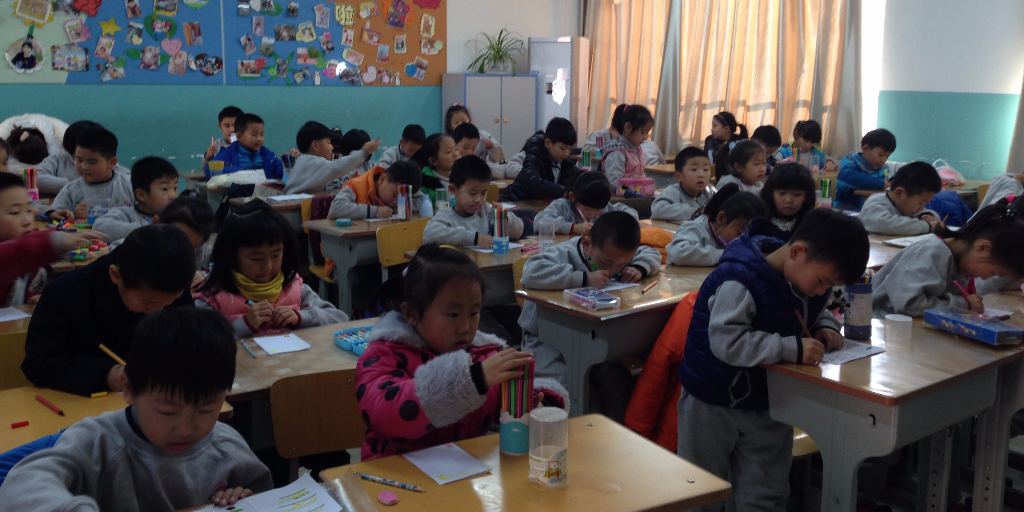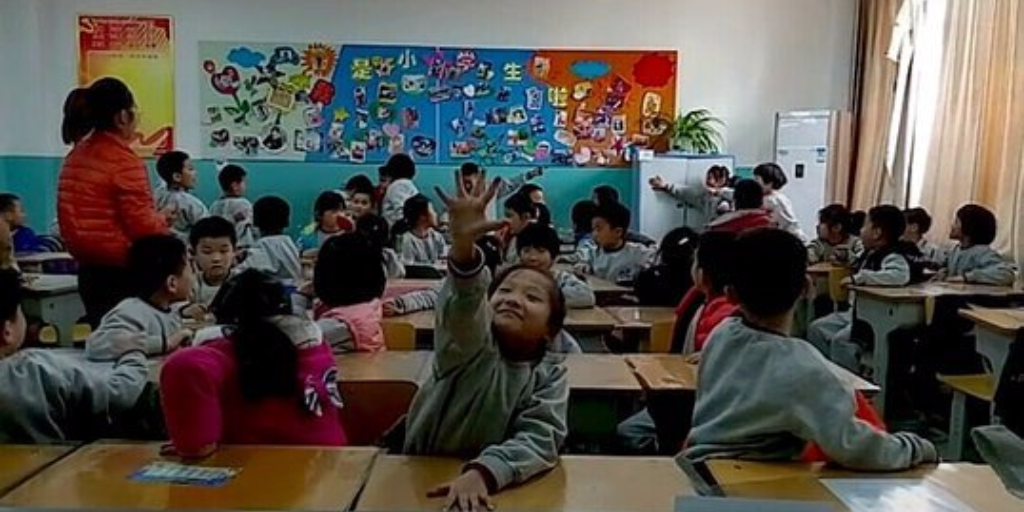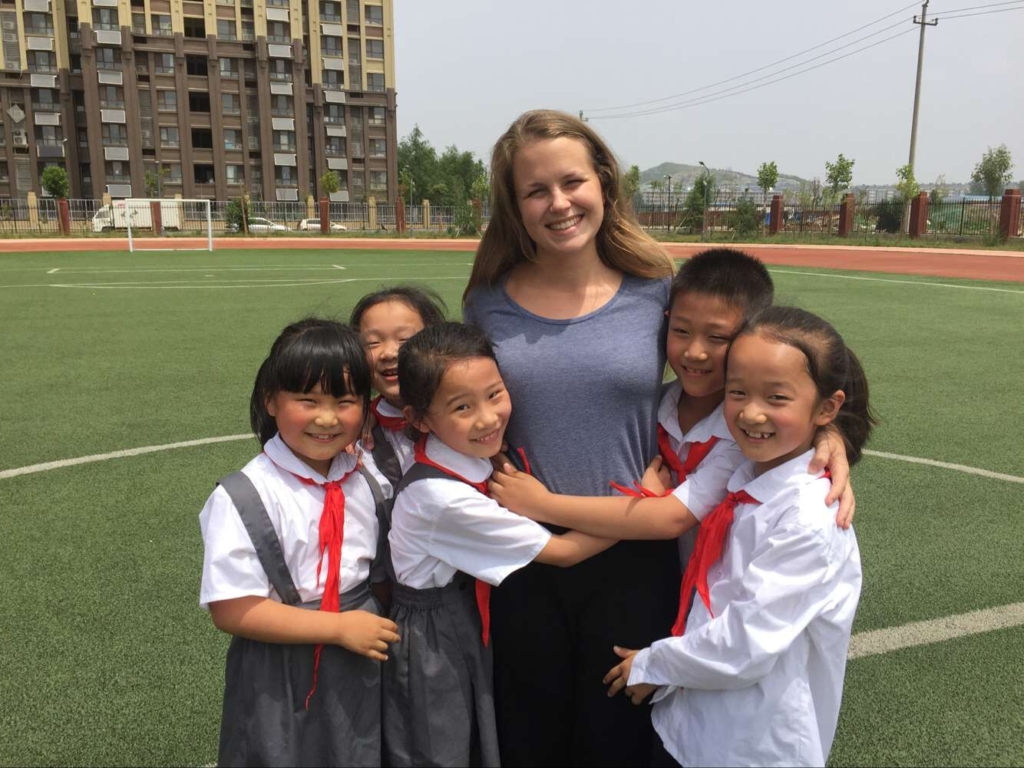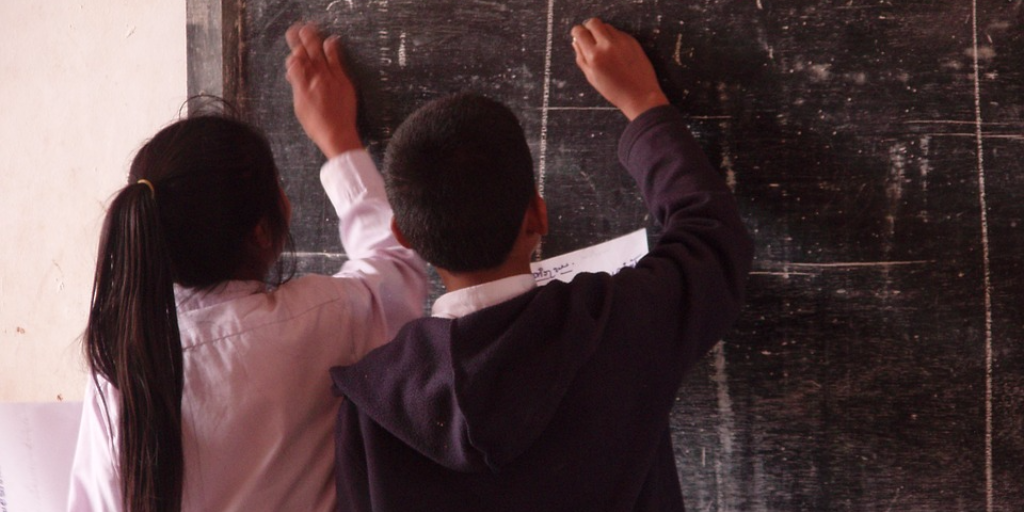Teaching at a Chinese primary school has undoubtedly been one of the biggest culture shocks I’ve faced since arriving in China. Before getting here, I had heard, read and watched so much about the perception of teachers in Chinese culture. They are held in very high esteem and regarded as the fountain of all knowledge, meaning that Chinese students are among some of the most hardworking, disciplined and respectful in the world.
I therefore came to China expecting that classroom management would be the least of my worries. My expectations were confirmed at the training camp, where I taught a class of 20 perfectly behaved high school students. While aware that these students were high achievers with an interest in English, I couldn’t see past their impeccable behaviour. So, I headed to my city, Jinan, full of naïve optimism that my Grade 1 and 2 primary school students would be smaller, equally well-behaved versions of my students in Beijing.
The First Day Teaching at a Chinese Primary School
My naïve expectations meant I had the shock of my life when I entered my first class. I soon realised that my expectations couldn’t be further from the truth. In reality, I was faced with classes of over 50 excitable 6 and 7-year-olds, none of whom appeared to have seen a foreigner before. I entered the classroom to the piercing shrieks of 53 children, most of whom decided to prod and poke me. I spent the first part of the lesson desperately trying to keep my balance as my new students swung on my arms, kissed my hands, pulled my hair and touched my arms, legs and face. When they eventually got bored and made their way back to their seats, I attempted to start my lesson. However, I was soon drowned out by the sound of plastic desk covers being used as horns, physical fights, crying and more screams.
After the longest 40 minutes of my life, I left having taught absolutely nothing. I hadn’t learnt a single child’s name in a lesson called “what’s your name?” and felt extremely disheartened. I couldn’t help but wonder not only how I was going to get through 10 months of that chaos, but also why I had been so naïve to think that such young children would be disciplined simply because of their nationality.
After the First Day
Since this day, I have learnt a lot about teaching at a Chinese primary school, the education system and the daily lives of my students. My school was built three years ago to serve the rapidly growing population of a less well-off district in Jinan. With a primary and middle branch filling up year by year, there are currently only 4 years of students. Grades 1, 2, 3 and 7 currently make up a total student population of 1,300.
Known as one of the toughest in the world, the Chinese education system puts intense pressure on students and teachers. They are required to study and work long hours to achieve the best they can. The worrying consequences of underachievement create an air of competition at school and a mountain of homework for students. Though I was aware of long school days and intense pressure for middle and high school students in China, I hadn’t even considered the possibility that this also applies to primary school children. In fact, the demanding study routine begins on a child’s first day at school at the age of 6. This has probably been one of the most shocking things I have faced since teaching at a Chinese primary school.
The first few years of school are an important time for Chinese children. It’s here that they go through the rigorous process of becoming disciplined, learning to respect their teachers and studying from dusk till dawn; a routine that won’t end until after University. Consequently, students are thrown in at the deep end, with long school days and lots of homework from the start.
My School
Here in Jinan, the school day begins at the same time I used to wake up for school, 7.30. At this time, students march into their classrooms to sing the national anthem before class begins at 8. Each day consists of six 40-minute lessons, which closely resemble a University lecture. Children remain upright in their seats with their arms crossed, listening attentively to the teacher’s continuous stream of information. The Chinese teachers seem to have an incredible ability to control these large classes. All it takes is a clap for students to up straight, arms crossed, lips buttoned, and eyes locked on the board. These teachers are very open about favouring the smarter students and don’t hide who their favourites are. This only adds to the air of competition, as children try to win over their teachers.
Between every two classes there is a break of some sort. This doesn’t sound too demanding until you learn that these breaks consist of a regimented morning exercise routine, a 30-minute lunchbreak at their desks, a compulsory nap and singing and writing practice. No chance to study is wasted, leaving the children with virtually no time to play during the school day.
Following the 3.10 end of day bell, many students remain at school to complete compulsory character-building duties. Cleaning classrooms, helping teachers and practicing for competitions are some of the tasks they must fulfil outside of school hours. It’s not uncommon to see children wandering the corridors with an adult sized mop and bucket, a mountain of books or their teacher’s belongings until well after 4.30. They eventually arrive home to a mound of homework which they must usually tackle without the help of their parents. In many cases, students also attend extra lessons to help them get ahead of their classmates.
The Chinese School System
This intense school year comprises of roughly 38 weeks, which are divided into two semesters, lasting around 19 each. Aside from the lengthy summer holiday, students only get a break when the rest of the country does for important national holidays. There are no such luxuries as half term breaks.
Most Chinese schools require students to study core subjects such as Chinese, Maths and Music from Grade 1. They usually begin their study of English in Grade 3. This makes my school unusual; it’s aiming to become a specialised English school, so students begin learning in Grade 1. Consequently, students begin learning a foreign language before they can even read their native one. The children have a total of 5 English lessons a week; 4 with their Chinese English teacher and 1 with the foreign teacher. They are expected to learn to read and write basic English words, which are tested in frequent exams. As the foreign teacher of Grades 1 and 2, I have had quite a unique experience teaching at a Chinese primary school.
Foreign Teacher Classes
In China, the concept of learning through games and activities is very foreign to both students and teachers. They therefore tend to consider the ‘fun’ foreign teacher classes as less academic and less beneficial to their education. This, combined with the competitive, high-pressured school environment, means my busy Chinese teaching assistants often don’t show to my classes. I’m therefore often left to manage a class of over 50 six-year-olds with my elementary level Chinese.
It’s during these classes that I get to see the side of the students the Chinese teachers don’t. Since they aren’t usually allowed to play, they struggle to differentiate between educational games and playtime. As a foreigner, I don’t have the power of control the Chinese teachers have, so it can be difficult to quiet down such a large class. Amongst the noise and excitement, I sometimes see students using my class as a chance to start their homework. Though frustrating at first, now I better understand their daily lives, I can appreciate the difficulty of learning in an unfamiliar environment and concentrating in a class deemed less important. Therefore, rather than letting such behaviour frustrate me, I try to make my lessons as engaging as possible. I’ve found that by using the competitiveness of my students to my advantage and introducing reward systems, I can gain more control.
Overtime the students have grown used to my method of teaching and I’ve learnt how to manage them. Despite my classroom always being the loudest, I’ve learnt to accept that my classes will never resemble a Chinese teacher’s. Though teaching at a Chinese primary school is by no means easy, it’s certainly rewarding. When I enter a classroom to huge grins, cheers and hugs, I really appreciate my position as the “fun” teacher.
Final Thoughts
Teaching at a Chinese primary school has been like experiencing a different world. It’s a place where everything I was brought up to believe is turned upside down. Where teachers make no secret of who their favourite students are, where children can never be given enough homework and where play time is considered a waste of time. Teaching at a Chinese primary school has taught me more about the Chinese education system than any book ever could. It’s allowed me to meet some of the most resilient, hardworking and cheerful children and gain a new perspective. I couldn’t have underestimated what awaited me any more than I did and while it’s been one of the biggest challenges I have ever faced, it has been the most rewarding. It has made me cry with laughter and frustration, made incredible memories and given me stories to tell for years to come.
It’s an experience I wouldn’t change for the world.
Ready to take the ESL classroom by storm? Here’s more information on our program in China.
Or, if you’re still not sure, drop us a message; we’re here to help.
By Lauren Pettit, teacher in Jinan 2015-16





Leave A Comment
You must be logged in to post a comment.